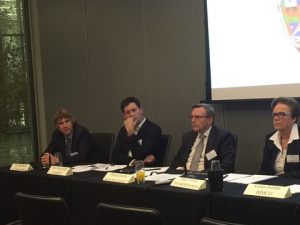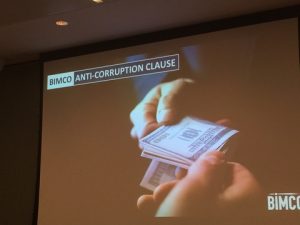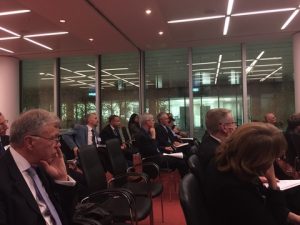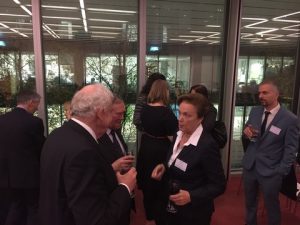
The panel with BIMCO’s Grant Hunter delivering his slides paper
‘Corruption in shipping has always been there, so there’s nothing we can do. I do not think that is enough any more’
Facilitation payments, made in order to “oil the wheels” to enable shipping operations to proceed on schedule came under the spotlight at a London Shipping Law Centre seminar on December 12th.
The premise was that such payments—below-the-counter monies or gifts paid to port captains, pilots and other officials for them to perform contractual duties for which they had been remunerated by their employers—were unlawful and, in some jurisdictions, illegal.
A panel of experts agreed on this, as they discussed ‘Contracting out of Corruption—the BIMCO Anti-Corruption Clause.’ The UK Bribery Act of 2010, the US Foreign Corrupt Practices Act and the OECD Anti-Corruption Treaty had provided the context for the drawing up of BIMCO’s own measure, recommended for use in charterparty agreements.

.The panel on a l to r: Tim Springett, Karl Even Rygh, Philip Roche (chairman) and Inga Froysa
The panel members—-Grant Hunter of BIMCO, Tim Springett of the UK Chamber of Shipping, and Oslo-based lawyers Inga Froysa of Torvald Klaveness and Karl Even Rygh of Nordisk—-had all contributed to the structure and wording of the new clause. The session was chaired by Philip Roche of Norton Rose Fulbright who were hosting the occasion at their London headquarters.
The Chairman declared: “We have to address the practice of undocumented goods and payments to people simply to get them to do the jobs they were supposed to do anyway. Facilitation payments are bribes. Nevertheless, you have to deal with what is in front of you.”
Grant Hunter maintained that while bribery and corruption were endemic in international trade and industry, shipping was not a major offender. Inga Froysa was unequivocal. “Some say corruption has always been there so there’s nothing we can do. I do not think that is enough any more. Why should we be held to ransom by people who are already paid for the services they are supposed to provide anyway.”
BIMCO had taken the view that the charterparty clauses on corruption, introduced by some charterers, were unfair, disproportionately favouring the charterer rather than the ship owner. This was described by the panellists as “draconian.” Consequently, the BIMCO Committee had worked on a new and fairer clause, essentially to protect the owner and intended to supersede the “draconian” one.

…
Mr. Hunter said the anti-corruption clause was essentially voluntary and encouraged owners and charterers to work together to resist bribery requests. There were provisions in the clause to minimise delays and to discourage charterers and owners from getting out of charters they regarded as unfavourable—-although an act of bribery might in itself be viewed as grounds for termination. Collaboration was a most important element if the clause was to be applied successfully.
If charterers do not co-operate, the Master’s letter of protest under the clause is the trigger for any delay caused in resisting the bribery demand so any time lost counts as laytime and the vessel remains on hire.
The new clause should also help to keep the number of prosecutions over time to a minimum, by providing that the offending party defends and indemnifies the other party against liability, fines etc.
Ms Froysa said the main function was to gain recognition from all parties that corruption existed and that it was necessary to work together to resist demands for bribes and facilitation payments. Masters should not be left to face bribery situations alone. They should not take decisions without referring to their companies.

A view of delegates at the left side of the auditorium
Bribery Act
Tim Springett emphasised that the UK Bribery Act 2010 was “undoubtedly a major driver behind the BIMCO clause. The Act had led to considerable anxiety among ship operators. It introduced a new offence of failure to prevent bribery, wherever it was committed.” The Act did not distinguish in principle between low and high levels of transgression.
He stressed the importance of a “high information level” in terms of identifying facilitation payments. He confirmed “we want to stop people using the incidence of a facilitation payment as an excuse to escape from an unfavourable charter.”
Immediate realities
Mr Hunter summarised the reality of dealing with pilot payment requests. If not paid (even 200 cigarettes), subsequent lack of co-operation might well have adverse commercial consequences. Masters were often under pressure from charterers to ensure operations proceeded smoothly. Not to make facilitation payments could result in extra costs or delay, such as demurrage or the vessel being late for its next fixture.
The economic reality of the vast majority of charterparties is that neither shipowners nor charterers want the charterparty to terminate. Hence a clear incentive to pay up rather than risk delaying the vessel.
Opposition
Karl Rygh was concerned that “a lot of countries and parties are not really interested in actively opposing anti-corruption activities. Some people want to keep quiet about it.” Mr. Hunter added: “I suppose that if you don’t want to tackle corruption, don’t insert an anti-corruption clause in your charterparty agreement.”
Philip Roche provided examples of this lack of enthusiasm. “Even though Nigeria has passed anti-corruption legislation, it does not seem to have stopped it.” In Argentina, officials had been known to allege faults in ships, such as a dirty hold. Rather than fork out several thousand dollars for cleaning operations—not that a decent job would be likely—why not just pay a bribe which would be less costly than an unnecessary hold cleaning?

From the drinks and dips networking reception; Robert Gay form Hill Dickinson, Grant Hunter and Dr. Aleka Mandaraka-Sheppard, founding director of the LSLC
Corporate anti-corruption policies
Spurred on by US and UK legislation, some large corporate organisations—-both ship owners and charterers—had developed their own anti-corruption policies with a view to dealing with whatever situations arose. Big tanker parties were usually in this category.
Inga Froysa noted that some oil majors were MACN members and ought to consider the BIMCO clause. In Norway, a number of shipowners had included it in their charterparty agreements. “Some large companies are adopting zero tolerance policies, with perhaps more success than we would have anticipated.”
Mr. Roche felt that with “more and more anti-corruption clauses in place, more ship owners are confident in resisting making payments.” Using an anti-corruption scale, companies could assess how far they had different procedures to deal with corruption.
What fraud?
Mr Springett said discussions with the Serious Fraud Office had not been fruitful, in terms of the circumstances when action would be taken under the Act. “They did not show any understanding of British companies trading in countries where corruption is endemic. No one is offering any incentive to provide a response on what to do when facilitation payments are requested.”
Masters needed guidance on procedures which should be followed when a demand was made for a facilitation payment. “We recommend that reports are made of such demands.”
Policing
The audience was concerned that more people were required at inter-regional level to prevent and root out corruption—and questioned the effectiveness of those already charged with doing so. Were those bearing the responsibility pulling their weight?
Mr. Hunter said there was a move to develop anti-corruption staff with training offered by the Maritime Anti-Corruption Network—-and some work had been done on the causes of corruption. However, “there is no silver bullet—no quick fix. We have to try to get under the skin of corruption.”

Inga Froysa at centre stage discussing with delegates
Monitoring performance
The panel agreed that it was too early to assess the impact of the BIMCO clause and anti-corruption policies in general. Inga Froysa had not come across any instances of people questioning how the BIMCO clause worked. “How successful is it? Do people have problems with it? We want to hear from users.”
Mr Rygh maintained that many owners had anti-corruption clauses and intended to use them if necessary. “It is very important to have a clause which shows balance and will work. I am not aware of any practical deployment of the clause as yet. It is not so easy to determine what someone should do when individual instances arise. We need feedback re zero tolerance.”
The long haul
Mr Springett was very proud of the work done by ICS and BIMCO on the clause. “However, it will take more than just the UK passing a law and masters trying to resist making payments. It will take a lot of participation from governments in the developed world and in developing countries. Many of the latter have fewer people working in the regular economy than in the black economy (with its more extensive bribery culture). It is not acceptable that masters should be put under such duress just to get ships operating on schedule.
“We wish to promote collaboration and deal with the problem in a proper way over the long haul.”
Thanking the panel, London shipping Law Centre Director Jeremy Thomas described BIMCO’s work as an “honourable attempt” to put together a workable clause, complying with anti-bribery legislation.






1 comment
A very important topic for discussion. In many instances, it is just part of doing business and many in the maritime industry know this and just deal with it.